The AMD 2nd Gen Ryzen Deep Dive: The 2700X, 2700, 2600X, and 2600 Tested
by Ian Cutress on April 19, 2018 9:00 AM ESTCPU Office Tests
The office programs we use for benchmarking aren't specific programs per-se, but industry standard tests that hold weight with professionals. The goal of these tests is to use an array of software and techniques that a typical office user might encounter, such as video conferencing, document editing, architectural modelling, and so on and so forth.
All of our benchmark results can also be found in our benchmark engine, Bench.
Chromium Compile (v56)
Our new compilation test uses Windows 10 Pro, VS Community 2015.3 with the Win10 SDK to combile a nightly build of Chromium. We've fixed the test for a build in late March 2017, and we run a fresh full compile in our test. Compilation is the typical example given of a variable threaded workload - some of the compile and linking is linear, whereas other parts are multithreaded.
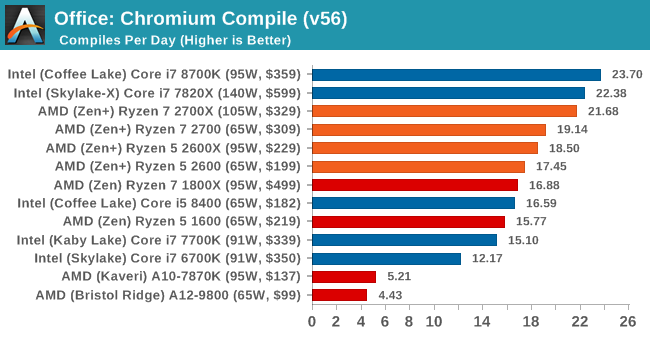
Having redone our compile testing, we can see that the new Ryzen-2000 series parts do provide a good uplift over the first generation, likely due to the decreased cache latencies and better precision boost. Performance per dollar between the 8700K and the 2700X would seem to be about equal as well.
PCMark8: link
Despite originally coming out in 2008/2009, Futuremark has maintained PCMark8 to remain relevant in 2017. On the scale of complicated tasks, PCMark focuses more on the low-to-mid range of professional workloads, making it a good indicator for what people consider 'office' work. We run the benchmark from the commandline in 'conventional' mode, meaning C++ over OpenCL, to remove the graphics card from the equation and focus purely on the CPU. PCMark8 offers Home, Work and Creative workloads, with some software tests shared and others unique to each benchmark set.
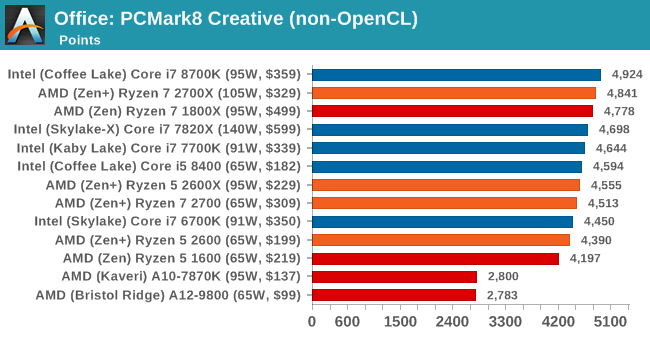
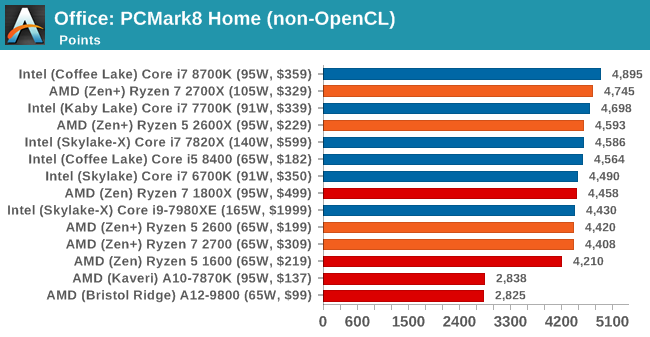

PCMark 10
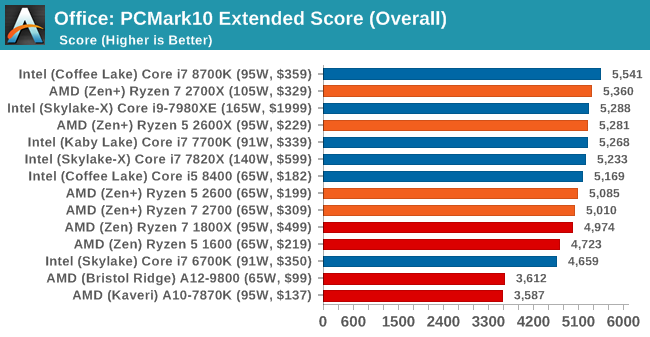
GeekBench4
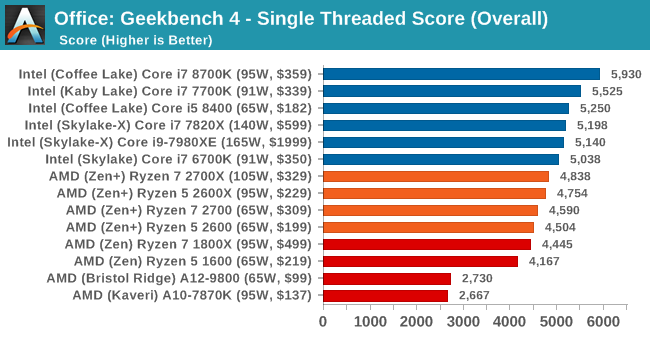
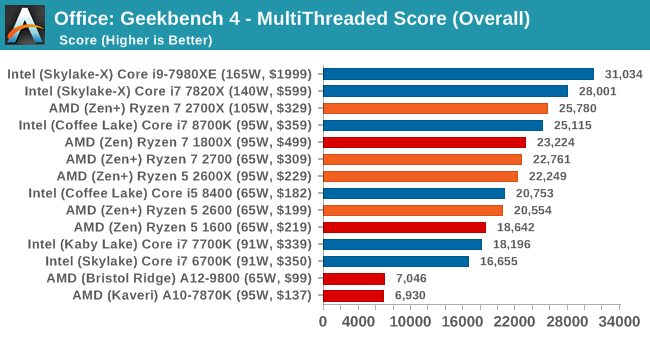
If you live and breathe GeekBench 4, then the single threaded results put Intel firmly in first place. For the multi-threaded tests, the top Intel and AMD mainstream parts are going at it almost neck-and-neck, however it is clear that the previous generation quad-cores are falling behind.










545 Comments
View All Comments
jjj - Thursday, April 19, 2018 - link
I was wondering about gaming, so there is no mistake there as Ryzen 2 seems to top Intel.As of right now, I don't seem to find memory specs in the review yet, safe to assume you did as always, highest non-OC so Ryzen is using faster DRAM?
Also yet to spot memory letency, any chance you have some numbers at 3600MHz vs Intel? Thanks.
jjj - Thursday, April 19, 2018 - link
And just between us, would be nice to have some Vega gaming results under DX12.aliquis - Thursday, April 19, 2018 - link
Would be nice if any reviewer actually benchmarked storage devices maybe even virtualization because then we'd see meltdown and spectre mitigation performance. Then again do AMD have any for spectre v2 yet? If not who knows what that will do.HStewart - Thursday, April 19, 2018 - link
I notice that that systems had higher memory, but for me I believe single threaded performance is more important that more cores. But it would be bias if one platform is OC more than another. Personally I don't over clock - except for what is provided with CPU like Turbo mode.One thing that I foresee in the future is Intel coming out with 8 core Coffee Lake
But at least it appears one thing is over is this Meltdown/Spectre stuff
Lolimaster - Thursday, April 19, 2018 - link
Intel 8 core CL won't stop the bleeding, lose more profits making them "cheap" vs a new Ryzen 7nm with at least 10% more clocks and 10% more IPC, RIP.HStewart - Thursday, April 19, 2018 - link
I just have to agree to disagree on that statement - especially on "cheap" statementACE76 - Thursday, April 19, 2018 - link
CL can't scale to 8 cores...not without done serious changes to it's architecture...Intel is in some trouble with this Ryzen refresh...also worth noting is that 7nm Ryzen 2 will likely bring a considerable performance jump while Intel isn't sitting on anything worthwhile at the moment.Alphasoldier - Friday, April 20, 2018 - link
All Intel's 8cores in HEDT except SkylakeX are based on their year older architecture with a bigger cache and the quad channel.So if Intel have the need, they will simply make a CL 8core. 2700X is pretty hungry when OC'd, so Intel don't have to worry at all about its power consuption.
moozooh - Sunday, April 22, 2018 - link
> 2700X is pretty hungry when OC'dAnd Intel chips aren't? If Zen+ is already on Intel's heels for both performance per watt and raw frequency, a 7nm chip with improved IPC and/or cache is very likely going to have them pull ahead by a significant margin. And even if it won't, it's still going to eat into Intel's profit as their next tech is 10nm vs. AMD's 7nm, meaning more optimal wafer estate utilization for the latter.
AMD has really climbed back at the top of their game; I've been in the Intel camp for the last 12 years or so, but the recent developments throw me way back to K7 and A64 days. Almost makes me sad that I won't have any reason to move to a different mobo in the next 6–8 years or so.
mapesdhs - Friday, March 29, 2019 - link
Amusing to look back given how things panned out. So yes, Intel released the 9900K, but it was 100% more expensive than the 2700X. :D A complete joke. And meanwhile tech reviewers raved about a peasly 5 to 5.2 oc, on a chip that already has a 4.7 max turbo (major yawn fest), focusing on specific 1080p gaming tests that gave silly high fps number favoured by a market segment that is a tiny minority. Then what happens, RTX comes out and pushes the PR focus right back down to 60Hz. :DI wish people to stop drinking the Intel/NVIDIA coolaid. AMD does it aswell sometimes, but it's bizarre how uncritical tech reviewers often are about these things. The 9900K dragged mainstream CPU pricing up to HEDT levels; epic fail. Some said oh but it's great for poorly optimised apps like Premiere, completely ignoring the "poorly optimised" part (ie. why the lack of pressure to make Adobe write better code? It's weird to justify an overpriced CPU on the back of a pro app that ought to run a lot better on far cheaper products).